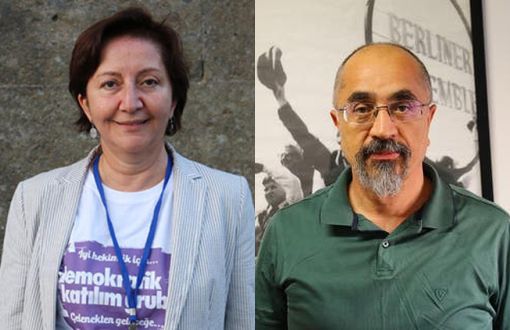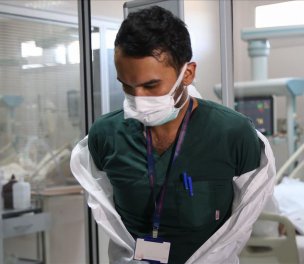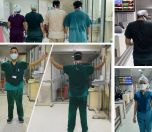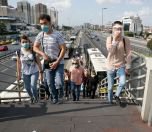‘Outbreak is coming on us like a tsunami’

Click to read the article in Turkish
While the number of novel coronavirus (COVID-19) cases is increasing in the capital city of Ankara, it is expected that the other major cities of Turkey, especially İstanbul, will follow suit in a few weeks.
We have spoken with İstanbul Medical Chamber Chair Prof. Pınar Saip and Ankara Medical Chamber Chair Dr. Ali Karakoç about the recent situation in the two cities and the steps to be taken against the outbreak.
Both physicians have stressed that contact tracing teams must be strengthened, COVID-19 positive patients must be quarantined in a more suitable manner rather than sending them home and healthcare workers, who have been suffering from burnout in this process, must be protected.
'Family and friends call for beds, but they are full'
Talking about Ankara, where the increase in the number of cases is straining intensive care units, Dr. Ali Karakoç has said, "If we receive 10 phone calls a day, five of them are from the press and the other five are from family and friends who ask for help to find an intensive care unit or bed.
"The number of cases is really high in Ankara; the Intensive Care Specialists Association has announced the occupancy rate as 80 percent, but we do not know if it covers children's and newborn intensive care.
"Intensive care units and beds are full in the city. Patients are awaiting their turn from the coordination center.
'Health workers must be appointed immediately'
Dr. Ali Karakoç has listed the measures to take as follows:
"Serious and epidemiologically appropriate contact tracing teams need to be established. We have a few of them, the current teams cannot come to the help of everyone. Health Ministry workers, auto body shop workers, cleaning personnel have also joined these teams. However, their job must be to bring medication and identify contacts.
"For this reason, health workers must be appointed as soon as possible. This can partly be a solution to the depression and burnout that we are currently experiencing. Moreover, the hospitals closed because city hospitals have opened must be reopened as soon as possible."
'Otherwise we have a difficult time ahead'
Dr. Karakoç has said, "A family has just called, there are five people at home, one of them has the symptoms and has tested positive for the virus. This person has transmitted the virus to all of them.
"It is not enough to follow up patients only at home. But the country cannot get through this if all patients are treated as inpatients.
"The solution to this is contact tracing and the quarantine of contacts. Everyone who contacted a COVID-19 case needs to be quarantined and the ones who have the symptoms must be isolated."
Ankara Medical Chamber Chair Dr. Karakoç has added that the current state of affairs in the country is not good at all:
"Health Minister has already announced that there has been an increase in the number of cases in İstanbul. They are calling from neighboring cities and saying that there are no longer vacancies at hospitals.
"The outbreak is coming on us like a tsunami. A new coordination center which also incorporates professional health organizations must be established. One must work with scientists and health workers. Otherwise, we have a really difficult time ahead of us. Now, each day is passing more problematic than the previous one..."
'Isolation areas are needed'
Prof. Dr. Pınar Saip has emphasized the importance of the participation of experts and professional health organizations in these works:
"Relevant institutions must come together. It is not a process that is supposed to be managed by the Interior Ministry. Specialty associations, professional chambers and public health institutions must work together and outbreak measures must be taken by prioritizing primary health care.
"Professional chambers must be definitely consulted and primary health care services must be reinforced. Conditions must be improved.
"Health workers have seriously burned out. Virus is spreading among health workers. Serious measures need to be taken at hospitals and primary care.
"In İstanbul, most patients are treated at home, too. When they have problems with accessing medication, they go to hospital and the outbreak spreads like this. People are mostly treated at home, but it is impossible to control the conditions there. Isolation areas need to be formed."
'Measures cannot solely be left to citizens'
Saip has noted that all services other than emergency ones need to be halted as soon as possible, adding that there is an attitude as if there was no outbreak: "Measures cannot solely be left to citizens. If the authorities do not take this seriously, citizens cannot take the measures anyway.
"The mortality rates are increasing and the occupancy rate of intensive care units has reached a serious level. There are several citizens who are treated for the disease despite testing negative. Data pertaining to this must be shared and the picture about this needs to be brought to light." (AS/SD)
bianet submits shadow report to UN Human Rights Committee

Imprisoned lawyer exposes use of disciplinary investigations to pressure political prisoners

Tap water ‘smells of bleach’ in Muğla prison

Censorship on a letter from prison describing hunger

Prisoner on hunger strike: 'I am alone without sunlight'










-132.jpg)